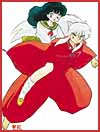by Luis Reyes
|
A couple who has infected their son with an experimental virus continually use the youth's medically manipulated bone marrow in their avaricious attempts at alchemy. But instead of conjuring gold, the mad scientists conjure the seven lucky gods of Buddhism who end up being extremely unlucky for the family of modest means now expected to house and feed the playful deities. All the while, the fiery pre-teen longs for his parents' attention.
Rather than playing into clichés or expectations, manga artist Rumiko Takahashi ("Ranma 1/2," "Maison Ikkoku," "Urusei Yatsura") has based a career on bringing non sequiturs into the realm of sincere human emotions. The preceding synopsis of "The Golden Gods of Poverty" from Takahashi's "Rumic World Trilogy Vol. 2" at once illustrates her concern for social issues, her cynicism about man's base motives and her perverse treatment of the sacred. Takahashi's idiosyncratic wit continues to stand out in the field. This probably accounts for the host of producers, cameramen, interviewers, bright lights and big smiles shoehorned into a decoratively carpeted meeting room at the Hyatt in downtown San Diego on ComicCon weekend. Under the watchful gaze of understandably litigious administrators and scampering personnel, Akadot's Luis Reyes and Sandy Yang spoke with Takahashi. Akadot: So the first question I have is something you've probably been asked a lot, but what do you feel is the wide appeal of your work? Takahashi: I really can't say what the exact reason is. But I think maybe it's that the art style and the storytelling in my comics are very straightforward and easy to understand, especially genres like comedy, such as "Ranma �." I think this slapstick sort of comedy is universal. It just transcends any sort of borders, so I guess that might be the reason why it's so popular here. Akadot: What about your darker work, like the "Mermaid" series and things like that? Takahashi: Is that popular? Akadot: Well, it's popular with me. I'm just interested in it. Takahashi: I really can't say. I don't know (laugh). Akadot: Ok, we'll get into more specific questions rather than worrying about these kinds of surface level issues. A lot of your fans and articles about you focus on your unique and in depth use of characterization. So I wanted to look at some of your characters and maybe try to analyze what is appealing about them. To start with, do you have a general comment about your characters? What makes you like one of your characters? Takahashi: In developing most of my series, I think of the basic frame in which the whole story will take place and, within that frame, I think of the main character of the story, the hero and the heroine. And then, coming up with periphery characters, I try to come up with characters that will build up and bring forward the two main characters in that storyline. Akadot: Do you ever find that sometimes those side characters become so interesting and so completely fleshed that they eclipse the central relationship? Takahashi: It's happened (laugh). Akadot: Specific examples? Takahashi: Oh, for example, one of the characters in "Urusei Yatsura" called Yunosuke. Umm�she just sort of ate up other people's characters (laugh). Took on many fans, I guess. Akadot: Is it usually the comic characters that do this? Has there ever been a circumstance in which a dramatic character has actually eclipsed the main storyline? Takahashi: What do you mean? Akadot: Instead of a comic character doing it, someone who's going through a rather deep, emotional experience or something like that. Takahashi: Just speaking generally, I don't think I've consciously ever created a character to eclipse another character. But there was an instance in "Maison Ikkoku" in which Mitaka and Godai both love Kyoko. Mitaka, however, eventually falls out of love with Kyoko and gets together with another woman. And during that whole sequence, I had a lot of Mitaka in the comic, and the readers had a great emotional response to that because they wanted to read more about Kyoko and Godai rather than the storyline about Mitaka. They complained, "Why are you drawing him so much? Why don't you concentrate on the main story?" But otherwise, I don't personally, consciously try to do anything to eclipse another character. In the process of storytelling, readers might interpret it that way. Akadot: Well, what about a character like Godai, with his incessant pursuit of the girl he loves. What makes him a sympathetic character versus just a pathetic character? What do you feel makes him sympathetic? Takahashi: Oh god, what a difficult question. I never thought of Godai as being a pathetic character. He's a ronin, which is basically a high school graduate who failed to pass the entrance exams for college. That is very common in Japan. So I think that the situations he gets into, all of "Maison's" readers have experienced one or two of them themselves. He's like the embodiment of a typical teen trying to make it in the world. Sure it's a comedy and a love story, so some of it is more exaggerated or deformed, but I think he is never a pathetic character, but more of a character you want to encourage or help. |

